Identity, Relationships, and Agency: Powering Learning in New Zealand
CompetencyWorks Blog
Denise Airola and a team of educators from Arkansas traveled to New Zealand to learn about their educational approach. Here are a few of their highlights. (Originally posted at Office of Innovation for Education on October 30, 2017.)
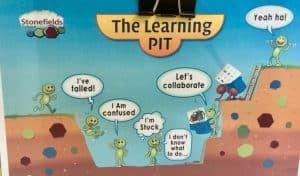 Already our week of school visits in New Zealand has passed and I am finally sitting down to pen this blog. Traveling across the international date line can prove exhausting! Also, I’ve needed some time for reflection–time to process my learning and figure my next steps to apply my learning.
Already our week of school visits in New Zealand has passed and I am finally sitting down to pen this blog. Traveling across the international date line can prove exhausting! Also, I’ve needed some time for reflection–time to process my learning and figure my next steps to apply my learning.
At first I thought that I could synthesize what I learned across all the school visits and simply summarize the themes that were the most resonant. Distilling the most personally impactful themes for me came quickly: Identity, agency, and relationships. Yet, the unique school stories behind these themes are too powerful to share in a single blog post. And so, I will share my reflections from each school over a series of blogs over the next two weeks in order to do justice to the learning and the profound experience our delegation of learners (teachers and leaders) has had in New Zealand.
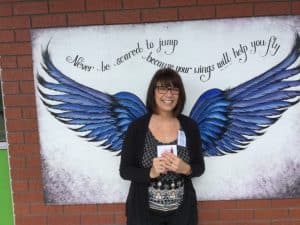 I’ll start where we started–at Stonefields School. The school was built in an old rock quarry in an area outside of Auckland that has risen, literally, out of the bedrock of the terrain in response to the rapid growth of the population in the city. Since each school in New Zealand is autonomous, each school is unique in how it approaches learning. Each school uses the sparse national curriculum (standards in US) and Key Competenciesprovided by the Ministry of Education to develop a local curriculum and learning strategies for
I’ll start where we started–at Stonefields School. The school was built in an old rock quarry in an area outside of Auckland that has risen, literally, out of the bedrock of the terrain in response to the rapid growth of the population in the city. Since each school in New Zealand is autonomous, each school is unique in how it approaches learning. Each school uses the sparse national curriculum (standards in US) and Key Competenciesprovided by the Ministry of Education to develop a local curriculum and learning strategies for 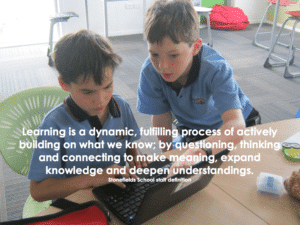 engaging students.
engaging students.
Stonefield’s staff envision learning as an active, collaborative process. Their vision is for each graduate of the school to build his/her learning capacity, collaborate, make meaning, and break through to soar on their way to their next level of learning.
We learned about the 5 big ideas that power learning for their learners: The Pit, learner strategies (Learner Qualities and the Learning Process), learner agency, social, and real.
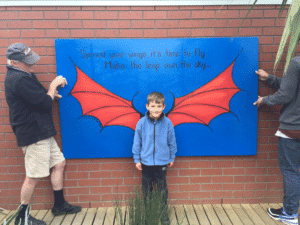 The Learning Pit is an important part of their strategy for building student agency and forming healthy identities as learners. Each child learns about the Learning Pit so that when they are confronted with productive struggle they have strategies for becoming ‘unstuck’ in their learning. Struggling with learning is understood as part of the learning process-not the identity of the learner.
The Learning Pit is an important part of their strategy for building student agency and forming healthy identities as learners. Each child learns about the Learning Pit so that when they are confronted with productive struggle they have strategies for becoming ‘unstuck’ in their learning. Struggling with learning is understood as part of the learning process-not the identity of the learner.
Identity and agency emerged as central to learners’ development of the key competencies—identity anchored in caring relationships with adults and peers and enriched by family, community, and culture. Agency is anchored in a shift in the power differential from teacher as the broker of learning to student as the broker of his/her own learning.
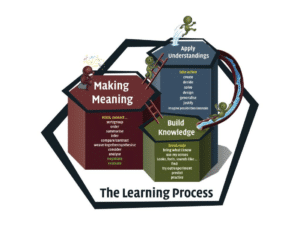
How do they manage this so well with over 600 children in the school and personalized pathways for them all? Students are equipped with Learning Process tools to power their learning and are expected to build knowledge by making meaning and applying understandings in an iterative cycle as they advance through their learning progressions. Transparent and child friendly academic learning language allows students to access personalized pathways through their progressions.
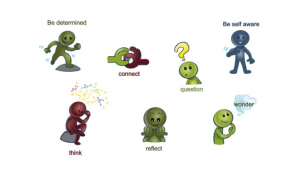 Learner Qualities are translated into child language so that all learners can encourage each other to engage their learner qualities if they find themselves in the Learning Pit or are digging deep into a Break Through.
Learner Qualities are translated into child language so that all learners can encourage each other to engage their learner qualities if they find themselves in the Learning Pit or are digging deep into a Break Through.
Speaking of Break Through, each learner spends 20 percent of his/her school week engaged in a Break Through which is a deep inquiry into an interest or passion of the student. In the end the learner is ready to fly–knowing how to learn and to pursue learning in a variety of ways!
Stonefields set a powerful first learning impression for our delegation. And yet there were equally powerful visits that followed. More on those in the next blog!
Denise Tobin Airola is the Director at Office of Innovation for Education at the University of Arkansas.